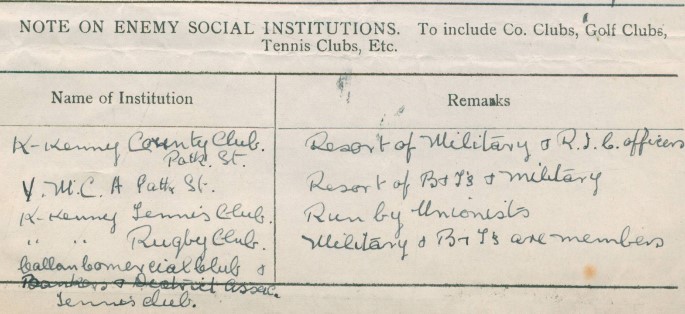
Archive documents reveal how Michael Collins managed the Kilkenny IRA during the War of Independence
A podcast supported by the Department of Tourism, Culture, Arts, Gaeltacht, Sport and Media under the Decade of Centenaries 2012-2023 initiative, reveals Michael Collins' links to Kilkenny during the War of Independence (1919 – 1921).
In this informative podcast available on Kilkenny County Council Library Service, Mooncoin author and historian Eoin Swithin Walsh explores two sources for how Collins managed the War of Independence in Kilkenny: the Michael Collins Papers and Kilkenny Council Papers.
Eoin says: "In this podcast we delve into two sets of records in the archives to find some Kilkenny related stories. These sources are the Michael Collins papers, held by the Military Archives, and the records of the Kilkenny councils, held by the National Archives. These records give us a good oversight of what was going on around County Kilkenny in the day to day lives of people; the revolutionary years weren’t always dramatic, the mundane parts of life still went on!
“For instance, Michael Collins received information about every post office in Kilkenny, highlighting which ones could be ‘worked on’ in order to glean intelligence. We also see how Collins’ department were writing to the Kilkenny IRA looking for money that went missing, that was supposed to be sent to a bank in Thomastown. Collins also received a list of ‘enemy social institutions’ in Kilkenny which included the golf and tennis clubs! The Council records give us an insight into everyday life in Kilkenny in 1921. Everything from compensation for hay burning to public health are discussed in these files.”
IRA leader Ernie O'Malley, may have criticised Kilkenny as slack” during the Civil War but these papers reveal that the county was at the forefront of the struggle for independence taking place nationally. The papers from both sources, the Collins papers from the National Archives and the various Kilkenny County Council papers offer a revealing glimpse into how day to day life proceeded even during tumultuous times.
Items of particular interest for Kilkenny people include the intelligence sent to Collins by the East Kilkenny Battalion in the spring of 1920, outlining the sympathies of all the post offices in the county and whether they also had a telegraph office. The report categorises who is sympathetic or unsympathetic, and who “might be worked on”. Collins astutely realised that the post offices were an invaluable source of local intelligence as well as a major part of the UK government's communications network in Ireland. At that time the the IRA and Sinn Féin were on the up as the Black and Tans hadn't yet arrived in the country.
Another intriguing tale is revealed in a letter from Collins to the Kilkenny IRA relating to the disappearance of £400 which went missing when it was sent to Thomastown's Hibernian Bank in 1921. The registered letter was intercepted by the IRA at Thomastown railway station (the group frequently took the mail to gather intelligence) and while the letter finally made its way to the bank, the money did not. Collins intervened and local IRA leader Christy Ennis managed to retrieve £395 of the missing funds and offered to make good on the missing £5.

The archive also contains a list of names sent to Collins of organisations that might be considered “hostile” to the republican movement including the County Club, the YMCA, Kilkenny Tennis Club and Kilkenny Rugby Club. These clubs were reported to number among their membership military personnel, member of the Black and Tans and Unionists.
Not all the intelligence gatherers for the movement were full time: Martin Cassidy of the Callan Road who was appointed as Intelligence Officer of the Kilkenny Brigade, also had a full time job at the Smithwick's Brewery and found it hard to get time off work to attend IRA meetings. Nevertheless, his intelligence reporting was commended as “very good”.
The council papers of the era also reveal that daily life went on despite the conflict. Matters including a local Diptheria outbreak in Thomastown, requests for compensation arising from conflict damages and rent arrears in Castlecomer all feature.
In the local elections of 1920, Sinn Féin enjoyed a remarkable landslide; they and the Labour Party (another nationalist party) won 95% of the vote. During that period, there were numerous councils in Ireland at rural, urban and borough level. In 1920, these Kilkenny councils had declared in favour of Sinn Féin (then considered illegal in the eyes of the UK government) thus complicating matters even further.
Some moneys and grants were still coming from the British Local Government Board and some council employees were still paid directly by them too. So while you might have republican sympathies, your wages might be coming from the foreign government you wanted to overthrow. To make the sacrifice of resignation wasn't possible for most, so they compromised. Many clerks in the Kilkenny councils were in communication with both the Sinn Fein and UK governments at the same time.
The podcast makes for a riveting insight into how even revolutionary politics must negotiate local politics, affiliations and personalities to succeed.
To learn more listen to:
Michael-Collins-Papers-and-Kilkenny-Council-Papers.mp3 (size 23 MB)
Subscribe or register today to discover more from DonegalLive.ie
Buy the e-paper of the Donegal Democrat, Donegal People's Press, Donegal Post and Inish Times here for instant access to Donegal's premier news titles.
Keep up with the latest news from Donegal with our daily newsletter featuring the most important stories of the day delivered to your inbox every evening at 5pm.